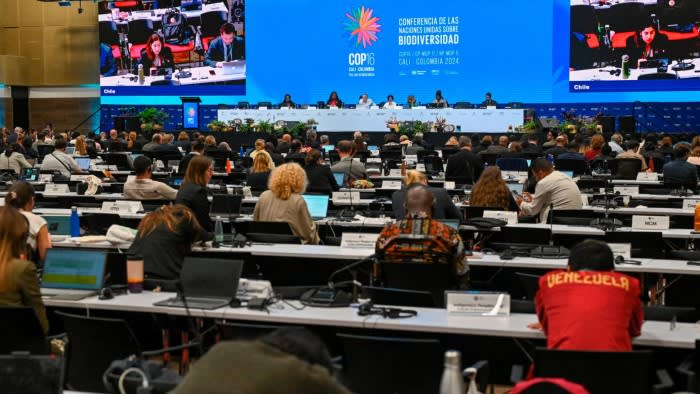It was agreed at the UN COP16 biodiversity summit that pharmaceutical companies and a number of other companies will be expected to voluntarily pay into a new fund covering the use of genetic data, but countries are expected to negotiate an extension. The negotiations dragged on and failed to reach a broader agreement on global finance for conservation. Paused.
The gathering of some 190 countries, a sister meeting to the two-week UN climate change summit in Cali, Colombia, will make progress on the goal of halting natural decline by 2030, agreed to last time in Montreal two years ago. was expected to do so.
But negotiators ended the final plenary session, which lasted through the night on Friday and much of Saturday, without a resolution on finance to support conservation goals.
Colombian Environment Minister and COP16 President Susana Mohamad was forced to adjourn the session after participants scheduled to fly out of the summit, leaving the number of delegates below the 130 needed for a quorum. It is unclear when and where it will reopen.

“The conference is not over. COP16 is not closed because it has not considered all the issues or adopted the (closing) report,” David said on behalf of the United Nations Convention on Biological Diversity Secretariat. Ainsworth said. COP16 was held. “The parties will now need to come up with an alternative date and venue for closing.”
However, he stressed that the already adopted agenda will only become formal if it is “approved by a treaty” to which all UN member states, except the United States and the Holy See, are signatories.
This includes a separate fund measure for corporate payments for the use of natural genetic data, which has proven to be one of the most contentious issues. There were also disagreements from countries such as India and Switzerland.
Companies in industries such as pharmaceuticals, cosmetics and agricultural technology now enjoy widespread access to this data for free. This data is typically collected by academic researchers and available through publicly funded open source databases.
The new multilateral mechanism will be funded by commercial users of so-called “digital sequence information.” The agreement was in response to demands from biodiversity-rich developing countries that companies pay a portion of the revenue from products developed using this data.
It was agreed that companies in the sector that “benefit directly or indirectly” from the use of this data should “contribute” 0.1 per cent of their revenue or 1 per cent of their profits to the new fund “as an indicator”. It was done.
Companies that met two of three criteria were expected to meet the requirements: $20 million in assets, $50 million in sales, and $5 million in profits.
A 0.1% contribution to sales would mean $67 million in payments last year alone from Switzerland’s Roche, the largest non-U.S. drugmaker by sales.
Negotiation experts say the use of the word “should” rather than “shall” suggests that it is essentially a voluntary contribution by businesses, rather than a mandatory tax, as some countries have called for. He pointed out that it meant something.
However, they added, multilateral agreements can create significant moral and reputational pressure on companies to comply.
The document also “urges” governments to take legislative or other measures to “encourage contributions” from businesses, opening the door to potential mandatory requirements.
The International Federation of Pharmaceutical Manufacturers slammed the decision, calling it “an incorrect balance between the intended benefits of such a mechanism and the significant costs to society and science it could generate.” said. Director-General David Reddy said the data was “crucial for the development of new medicines and vaccines”.
At COP16, they also agreed to create a new institution focused on the rights and interests of indigenous peoples.

However, no agreement was reached on a governance system for international biodiversity finance. In Montreal, countries agreed to increase funding for nature conservation and restoration to $200 billion a year by 2030, with rich countries agreeing to provide developing countries with $30 billion a year in aid by the same date. did. To help, countries agreed to establish a new fund under the Washington-based Global Environment Facility.
However, at COP16, developing countries expressed concern that the GEF was too heavily influenced by rich countries and called for the creation of a new fund with governance that better reflected the priorities of all countries.
Countries also failed to reach agreement on monitoring and evaluation to hold countries accountable for their official conservation and restoration commitments.
Brian O’Donnell, director of the non-profit Campaign for Nature, said: “It is worrying that the COP has been canceled without an agreed financial strategy.” “Without financial progress in the face of unprecedented biodiversity loss, the world continues on a path to loss of nature and species extinction.”
Juan Carlos Monterrey, Panama’s special representative for climate change, said smaller developing countries felt they were in an unequal competition as the conference entered its long final days.
“Small delegations from fragile countries are just there with a few negotiators. We have to be up 36 hours a day, but (in the big economies) someone is there at least twice a day. , wearing clean clothes and taking a shower,” he said. “This process is not fair to begin with.”
The 2025 UN Biodiversity Summit is scheduled to be held in Armenia, which has been selected since last week to host COP17, ahead of rival Azerbaijan, which will host the climate summit starting next week.
climate change capital

Where climate change meets business, markets and politics. Find out more about FT’s coverage here.
Interested in learning about FT’s commitment to environmental sustainability? Learn more about our science-based goals.



